
MAP
BOX
© Copyright 1999 Nigel Jones/MistWeb Software


Dartmoor is an area of high moorland in Devon, SW England. It is mostly open heath, scrub and grassland. There is extensive evidence of prehistoric and mediaeval life on the moor as it has not been settled in recent times. This is enough to make a wilderness trip more interesting but when you include the wildlife like the famous herds of wild ponies that roam free, Dartmoor is a very special place indeed.
 |
MAP |
| Java, Sketch Maps and Chartlets (not to be used for navigation!) © Copyright 1999 Nigel Jones/MistWeb Software |
|
In August 1998 we decided to leave the boat behind and fly to Exeter to spend time on the open moor. Hiking through some of the very pretty villages around the edge of this National Park also appealed to us.
We camped the first night on the banks of the River Dart in a large commercial campsite at an elevation of only 60m above sea level. The climb the next day to 410m we found exhausting. We took the 350m (1150 feet) slowly starting at about 12 noon. The first part of our route took us up through beautiful, dense broadleaf woodland. We found navigating in the wood to be a bit of a challenge. Some new paths had developed which were not shown on the map, and some of those that were looked very small on the ground. At sea or on open countryside you know regularly to fix a position and then shape a course. Here it was tempting simply to think in terms of 'Take the next left' or 'Turn right at the crossroads'. Once we had to backtrack. I learned that it is wise to check the heading of the present path every 50m to 100m in the absence of any distant landmarks.
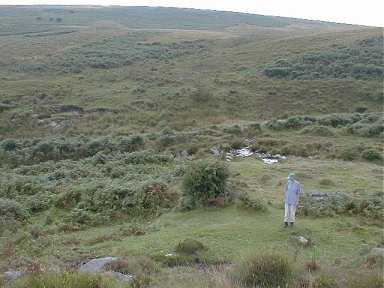 |
| Nicky surveys our campsite, overlooking the River Mardle, on Dartmoor |
Out of the woods we had some time on narrow country roads, then came the track which led up to the open moor. This climb was hard. Our packs each weighed about 25% of our body weight and it was a hot day. We walked very slowly upwards and twice we dumped our packs and sat to drink our water. Finally we reached a gate and were free of paths, lanes and tracks. We set off across the moor, surprised by the amount of bracken at first. This became more sparse as the ground levelled. We could see the valley to which we were heading. At this point we would have been glad to stop where we were, but our supply of fresh water was almost gone and we needed to get to the stream. Soon the ground began to fall away as our route entered the vale. As the bulge of the hillside allowed us to see down to near the water we started to track the river upstream. Dusk would not be far away as we scanned the lower levels. After a short time, we were very glad to find a perfect little campsite overlooking the tiny flood-plain of the miniature River Mardle. It was time to put up the tent and have our tea.
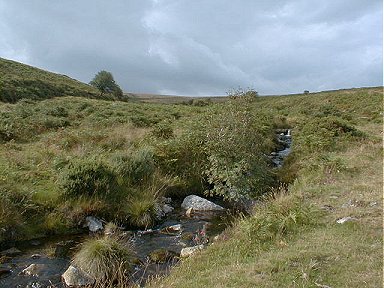 |
| The River Mardle which was to be our main source of fresh water. Let's hope there isn't a dead sheep rotting in it just up around that next bend... |
The River Mardle rises on Ryder's Hill and flows to the edge of the moor, then through the town of Buckfastleigh before joining the Dart - a total journey of about seven miles. Our camp was on level ground 20m from the river, about three-quarters of a mile from its source at Mardle Head. We found that the route from behind our tent to the river was very easy, with well-trodden grass. The sky was beginning to cloud over as we went to investigate. The river bank was shallow in one place with a little 'gulf' or 'bay' where clear water approached a clean, gravelled beach. We found out more about all this later that evening...
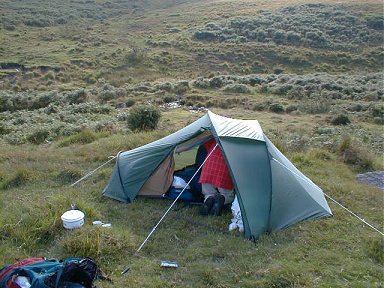 |
| The tent was soon up and storm-rigged. Then it was time to unpack and make our new home cosy and comfortable. |
We knew the weather forecast. A vigorous Atlantic low was moving rather quickly East and we expected wet and windy weather the next day. The tent was storm rigged with extra tent pegs at both ends of each of the three flexible poles and every guy-rope that the manufacturer had allowed for firmly fitted. The soil was beautiful, deep, rich loam almost black in colour. I was very confident about our anchorage.
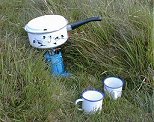 |
| Nothing is more important in any new home than that first cup of tea. |
At last it was time for that essential of life - a large mug of tea!!
 |
| Wild horses spent the early evening under their trees just yards from our tent. |
While we were setting up, half a dozen Dartmoor Ponies came to some nearby trees to watch us. They stood around and quietly watched us intently. After we'd eaten, we strolled a little way up the river. When we were about 100m away the sudden sound of galloping hooves from the direction of our tent startled us. We turned around and saw that, watched by perhaps now fifteen other animals, three of the boldest horses was making a dash past our (frightening looking!) tent to get down to the river to drink. They soon chased each other back up, within a meter of the head of our bed, to join the herd. After their bravery and success, we stood quietly and watched while other groups of twos, threes or fours went down their well trodden path to this favourite or important drinking place after the hot day. It wasn't long before mothers were taking their young foals past our strange UFO of a tent and all were satisfied.
We were very glad that our evening stroll had allowed them to slake their thirsts, but a little concerned that if too many others followed in the night, we may have trouble sleeping! We need not have worried. If any other wildlife did visit this favourite drinking spot while we were zipped into the tent, we did not hear their careful, neighbourly footfalls.
 |
| Cold fronts past, the sky was as blue as can be. Sheep and cattle also roam free on the moor. |
Over the next two days we saw more ponies as well as herds of cattle and sheep roaming free on the moor on both sides of the river. Some of them stood at the trees and watched us but we felt that very good neighbourly relations had been maintained on both sides.
After dark on our last night we were alerted by fast hoof beat very near us. When we looked out to see if there was any problem, we saw a rider whom we assume was a ranger or farmer fording the river accompanied by his sheepdog. Half an hour later we heard him return by the same route.
Surely enough the warm front passed over during the first night. Later in the night and throughout the next day winds reached Force 6 and 7 and it poured with rain continuously. The tent buffeted and bent but we remained dry and secure inside. We made one or two excursions outside wearing little but light waterproofs - it was not cold in the warm sector - but mainly we read, relaxed and listened to BBC Radio 4. Forecasts foretold a ridge of high pressure to follow so we patiently watched the grey billows, looking forward to this.
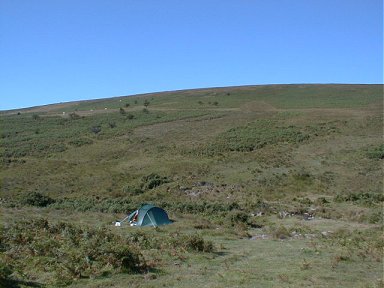 |
| There's an awful lot of space out here, and peace. And space. And peace. |
Our third day on the moor dawned bright and sunny with a breeze. We rigged a line between the horses' trees and by the time we had finished breakfast our waterproofs were flapping dry. We zipped up the tent and took our time strolling upstream toward Mardle Head. On the way we explored the remains of tin working which was the industry of these ancient moor dwellers.
Across the stream we saw a couple of people following a distant path. These were the first humans we had seen - apart from the lone horseman with his dog - since leaving the lowlands two days before. The effect had been achieved: there is some magic about the wilderness - some way in which it changes you. After a short time you can return to the busy world and you are different; because of this the world seems different. It happens when you have been at sea, and it also happens in the hills. It's an issue of perspective.
With this slightly new perspective we were happy to return to the villages. Perhaps we'd go and have a look at Buckfast Abbey...